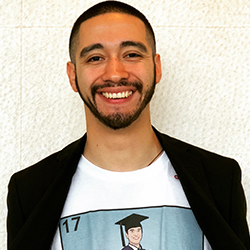2021 NASFAA Robert P. Huff Golden Quill Award Winners Recognized for PJ Equity Analysis
Related Topic in the Ref Desk: Professional Judgment
By Hugh T. Ferguson, NASFAA Staff Reporter
 As the pandemic wreaked economic havoc and quickly threw the higher education plans of students into a tailspin, many were left trying to make their way through the enrollment process, which in some cases was further complicated by the sudden changes to family finances.
As the pandemic wreaked economic havoc and quickly threw the higher education plans of students into a tailspin, many were left trying to make their way through the enrollment process, which in some cases was further complicated by the sudden changes to family finances.
Jaime Ramirez-Mendoza and Tiffany Jones of The Education Trust were attuned to this dynamic and in an issue brief provided a racial equity analysis of the professional judgment (PJ) process, which earned them NASFAA’s 2021 Robert P. Huff Golden Quill Award.
Their piece, "Using Professional Judgement in Financial Aid to Advance Racial Justice & Equity" released in December 2020, provided policy recommendations for the Office of Federal Student Aid (FSA) and highlights opportunities for financial aid offices to collect and use data to assess access and equity in their PJ processes, and to be intentional in training their financial aid administrators.
 At the outset of their research the authors sought to collect as much data as possible to best wrap their heads around the issue at hand.
At the outset of their research the authors sought to collect as much data as possible to best wrap their heads around the issue at hand.
"The biggest surprise for me was just that there wasn't a lot of publicly available data on how many of these requests were made," Ramirez-Mendoza said. "What were the decisions, how much money went out and when thinking of the people making the decisions, the financial aid officers, there also wasn't a lot of publicly available data on racial demographic backgrounds."
Throughout the report the authors highlighted the need for better data collection on PJ and offered critical guidance for how financial aid offices can build racial equity into their work.
Students can request a review of their financial aid eligibility through the PJ process on the basis of unusual circumstances, potentially making them eligible for more funds. Unfortunately, not all students know they can make such a request, commonly known as an appeal, which raises questions about how subjective and susceptible to bias PJ might be, according to Ramirez-Mendoza and Jones.
Due to the lack of institutional data on PJ there’s no ability to tell a national story on how the pandemic has exacerbated issues. Specifically in order to better understand how institutions are utilizing PJ the report urges the Department of Education (ED) to require institutions to collect data on PJ requests, as well as demographic information about financial aid administrators, and disaggregate that data by race and make it public.
"We definitely want to call attention to the potential issues, but there's no data, and I think that that's the story," Jones said. "We have to be tracking these things for better or for worse so a campus knows where they are, knows where they need to improve so students have an understanding, and more importantly the advocates can ring the alarm if there really is something that's widespread happening at a campus or nationally."
By analyzing and detailing the importance of having access to these data points future reports can better pinpoint areas of improvement to help spur financial aid for those in need.
For Ramirez-Mendoza and Jones receiving the Robert P. Huff Golden Quill Award served as both validation and helped to signify a shift in the national conversation around racial equity in higher education.
"I was just happy overall that what we wrote resonated with folks and hopefully it sparks equity centered conversations that leads to policy change at the federal and at the institutional level," Ramirez-Mendoza said. "Because at the end of the day, this can be a lifeline for students to continue into education and then graduate."
He also hopes their work will serve as a conversation starter to better understand the implications of systemic racism.
"Hopefully we start talking about systemic racism within financial aid because I feel like that's something that because it deals with numbers and algorithms people think that it isn't susceptible to systemic racism or implicit bias," Ramirez-Mendoza said. "But hopefully, not just this report but multiple reports and other people's practice conversation on the intersections of how racism can be embedded within policy and financial aid."
Be sure to leave your messages, comments, and congratulations in the comments section below!
Publication Date: 7/27/2021





Deborah K | 7/28/2021 2:10:30 PM
As the Executive Director of Financial aid at Pennco Tech trade school, I have gone above and beyond to ensure all my staff is fully trained on the Professional Judgement appeal process. I always express the importance of helping the student, and explaining what if you were in their shoes? You would someone to help you correct? Not many students know of the professional judgment process. Being the FAFSA now relies on prior prior year tax information, one of the first questions I have my financial aid officers ask in the students financial aid appointment is, "Have your financial circumstances changed significantly since the tax year the FAFSA is based off of?". If so, they move forward with asking additional questions to assist the student in becoming Pell eligible. I also explain to them to listen to the student when having a general conversation in the FA appointment. The student may make a simple comment that would encourage the financial aid office to ask more questions. Such as, "I was injured at work". That should make a light bulb go off and ask, well are you working right now due to your injury? Most schools do not utilize this process because of the amount of added work it adds to the processing of the financial aid package. At Pennco Tech we are about taking care of our students, no matter the amount of work it entails. I run two Financial Aid offices, Blackwood, NJ and Bristol, PA, and we process multiple professional judgements, with sufficient documentation, on a daily basis to ensure we give the student the best financial aid package we can to be sure the student can obtain their career goals! Ensuring a bright future.
-Debbie Keifrider
Executive Director of Financial Aid
Susan A | 7/27/2021 6:37:33 PM
Congratulations and thank you for doing this important work! And a great reminder in the importance that data can play bringing inequities in our processes to light.
Rebecca A | 7/27/2021 11:38:57 AM
As a woman of color and a woman in the industry I particularly would not want my demographics and personal information made available to the public. In order to know if there is diverse employment all one would need to do is visit the office. Students should be encouraged to meet with their aid office for inquiries on PJ outcomes. It is incumbent on students to have that discussion with their aid offices. Due to the holistic approach and nature of PJ we want to make sure are not releasing personal information. Rather, highlighting PJ options and information on how to appeal more visible to students, making time to meet with families about the options not just for PJ but other financial resources are better suited to creating equity in these situations. Students whose parents attended a university are aware of PJ options and can assist their children/students. Those students who are first generation or in other vulnerable groups do not and many times are not aware of the possibilities. For these reasons, partnerships on campus are vital to creating the support this student population needs.
You must be logged in to comment on this page.